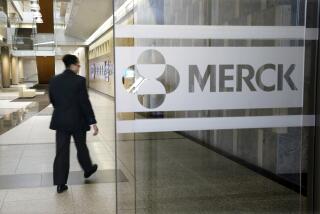Patent Protection Stifles Research
- Share via
James Flanigan’s analysis of Merck & Co’s profit outlook failed to consider the opposite side of the research/patent protection/profit equation, i.e., the cost of prescription medicine and the search for cures for those who need them [“Drug Firms Trying to Ease Doubts of Investors,” March 10].
Merck Chairman Gilmartin is disappointed because 2002 profit will be flat, about the same as 2001, $7billion, and that patent protection of an average of 12 years is not enough. I suggest that patent protection is too long, because it stifles research from going beyond the guaranteed cash flow.
An example of this occurred recently when the FDA approved a multiple sclerosis drug used in 110 countries but forbidden from sale in the U.S.
Biogen Inc. has had protection under the Orphan Drug Act since FDA approval was granted in 1996. None of the current MS drugs provide a cure and they are effective in less than 50% of the patients, but we had Biogen resisting the medication’s approval in the U.S. because its profit would be lower.
Biogen has not released any information on its success in going beyond their protected drug toward a cure since 1996, and their product costs patients $900 per month.
I am pleased to read of the size of Merck’s R&D; budget, and that they are pushing into the field of brain and nervous system disorders. Assuming for argument that they develop a breakthrough, will they bring a cure to market or something short with 12 years of patent protection?
Kevin Park
North Hollywood
More to Read
Inside the business of entertainment
The Wide Shot brings you news, analysis and insights on everything from streaming wars to production — and what it all means for the future.
You may occasionally receive promotional content from the Los Angeles Times.










